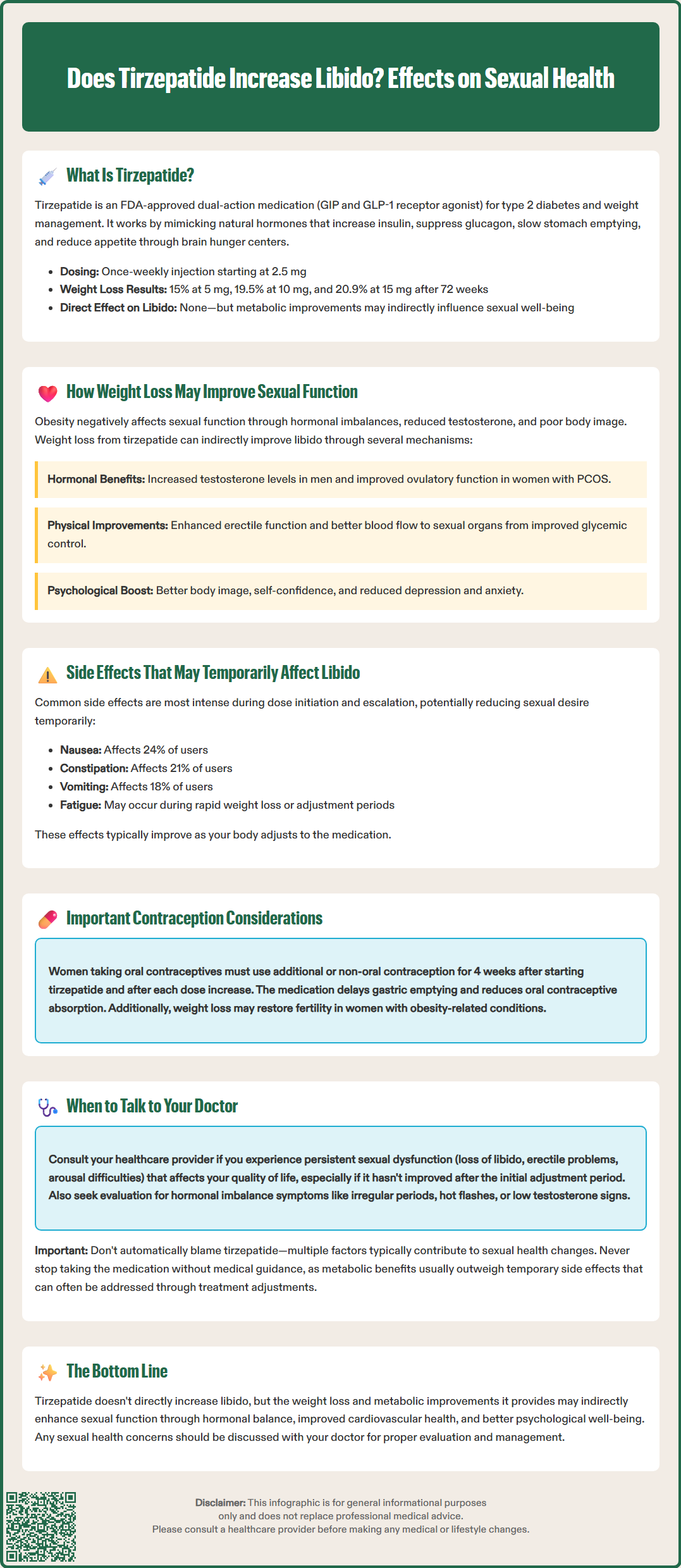LOSE WEIGHT WITH MEDICAL SUPPORT — BUILT FOR MEN
- Your personalised programme is built around medical care, not willpower.
- No generic diets. No guesswork.
- Just science-backed results and expert support.
Find out if you’re eligible

Tirzepatide (Mounjaro for type 2 diabetes, Zepbound for weight management) is a dual GIP/GLP-1 receptor agonist that has generated questions about its effects on sexual health. While tirzepatide does not directly target libido through its primary mechanisms, the substantial weight loss and metabolic improvements it produces may indirectly influence sexual function. Understanding the relationship between tirzepatide treatment and libido requires examining how weight loss, hormonal changes, medication side effects, and psychological factors interact to affect sexual health. This article explores the available evidence and clinical considerations for patients and healthcare providers.
Quick Answer: Tirzepatide does not directly increase libido, but the significant weight loss and metabolic improvements it produces may indirectly enhance sexual function through hormonal balance, improved body image, and better cardiovascular health.
Tirzepatide is a prescription medication approved by the FDA for the treatment of type 2 diabetes (marketed as Mounjaro) and chronic weight management (marketed as Zepbound). It belongs to a novel class of medications known as dual glucose-dependent insulinotropic polypeptide (GIP) and glucagon-like peptide-1 (GLP-1) receptor agonists. This dual mechanism distinguishes tirzepatide from single-action GLP-1 receptor agonists like semaglutide.
The medication works by mimicking two naturally occurring incretin hormones that regulate blood sugar and appetite. By activating GIP and GLP-1 receptors, tirzepatide enhances insulin secretion when blood glucose levels are elevated, suppresses glucagon release, slows gastric emptying, and reduces appetite through effects on brain centers that control hunger. These combined actions lead to improved glycemic control in people with diabetes and significant weight loss in both diabetic and non-diabetic individuals.
Tirzepatide is administered as a once-weekly subcutaneous injection, with doses typically starting at 2.5 mg and gradually increasing by 2.5 mg every 4 weeks as tolerated to a maintenance dose ranging from 5 mg to 15 mg, depending on individual response and tolerability. Clinical trials have demonstrated substantial weight loss in obesity studies—approximately 15% at 5 mg, 19.5% at 10 mg, and 20.9% at 15 mg after 72 weeks of treatment.
The medication does not directly target sexual function or libido through its primary mechanisms of action. However, the metabolic improvements and weight loss associated with tirzepatide treatment may have indirect effects on various aspects of health, including sexual well-being, which warrants careful examination of the available evidence.
Important safety information includes a boxed warning for risk of thyroid C-cell tumors and contraindications in patients with personal or family history of medullary thyroid carcinoma (MTC) or Multiple Endocrine Neoplasia syndrome type 2 (MEN2). Tirzepatide is not recommended during pregnancy.

Sexual function is influenced by a complex interplay of physiological, psychological, and social factors. Weight loss medications like tirzepatide can potentially affect libido and sexual function through multiple indirect pathways, though there is no official direct link established between tirzepatide and increased libido in clinical trials or FDA labeling.
Obesity itself is associated with reduced sexual function in both men and women. In men, excess weight contributes to lower testosterone levels, erectile dysfunction, and decreased sexual desire. Adipose tissue contains aromatase, an enzyme that converts testosterone to estrogen, leading to hormonal imbalances that can suppress libido. In women, obesity is linked to polycystic ovary syndrome (PCOS), hormonal dysregulation, reduced sexual satisfaction, and body image concerns that may diminish sexual desire.
Significant weight loss—whether achieved through lifestyle modification, medication, or surgery—has been associated with improvements in sexual function in multiple studies. Research suggests that weight reduction can increase testosterone levels in men, improve erectile function, enhance body image and self-esteem, and reduce symptoms of depression and anxiety that often accompany obesity. These improvements may translate to increased libido and sexual satisfaction.
However, the relationship is not uniformly positive. Rapid or substantial weight loss can sometimes be accompanied by fatigue or psychological adjustment challenges that may temporarily affect sexual desire. Nutritional deficiencies are uncommon with medication-assisted weight loss alone but may occur with inadequate dietary intake. Additionally, gastrointestinal side effects common with GLP-1-based therapies—including nausea, vomiting, and diarrhea—may reduce interest in sexual activity during the initial treatment period or dose escalation phases.
Importantly, weight loss may restore ovulatory function and fertility in some women with obesity-related menstrual irregularities or PCOS, which has implications for both sexual health and contraception planning. The net effect on libido likely varies considerably among individuals based on baseline health status, the magnitude of weight loss, and psychological factors.
Multiple factors can influence changes in libido during tirzepatide treatment, making it difficult to attribute any changes solely to the medication itself. Understanding these variables is essential for both patients and healthcare providers when evaluating sexual health during weight management therapy.
Metabolic and hormonal improvements represent a primary pathway through which tirzepatide may indirectly affect libido. Weight loss and improved insulin sensitivity can lead to favorable hormonal changes, including increased testosterone levels in men with obesity-related hypogonadism and improved ovulatory function in women with PCOS. Better glycemic control reduces oxidative stress and vascular inflammation, potentially improving blood flow to sexual organs and enhancing physiological arousal capacity.
Psychological factors play a substantial role in sexual desire. Many individuals experience improved self-confidence, body image, and mood as they lose weight, which can positively influence libido and sexual satisfaction. Conversely, the stress of dietary changes, medication side effects, or unrealistic expectations about weight loss outcomes may temporarily suppress sexual interest.
Medication side effects must be considered when evaluating libido changes. Common adverse effects of tirzepatide include nausea (approximately 24% in obesity trials), constipation (21%), vomiting (18%), and fatigue. These symptoms are typically most pronounced during dose initiation and escalation and may reduce sexual desire during these periods. Some patients may experience decreased energy levels that could affect libido, though this varies by individual.
Relationship dynamics and partner factors also influence sexual function. Weight loss may alter relationship dynamics, and partners may respond differently to physical changes. Communication about these changes is important for maintaining sexual health within relationships.
Underlying health conditions such as cardiovascular disease, diabetes complications, depression, or other chronic illnesses continue to affect sexual function regardless of tirzepatide treatment. Improvements in these conditions through weight loss may enhance libido, while persistent or worsening symptoms may suppress it.
Important contraception consideration: Tirzepatide delays gastric emptying and can reduce the absorption of oral contraceptives. Women using oral contraceptives should consider using a non-oral method or additional contraception for 4 weeks after initiating tirzepatide and for 4 weeks after each dose increase.
Open communication with healthcare providers about sexual health is essential for comprehensive medical care, yet many patients feel uncomfortable discussing these concerns. If you experience changes in libido or sexual function while taking tirzepatide, several situations warrant medical consultation.
Seek medical advice if you experience:
Persistent or worsening sexual dysfunction that affects your quality of life or relationships, including sustained loss of libido, erectile dysfunction in men, or difficulty with arousal or orgasm in women
New onset of sexual problems that began after starting tirzepatide and have not improved after the initial adjustment period during the first few weeks of treatment or dose increases
Symptoms suggesting hormonal imbalance, such as irregular menstrual periods, hot flashes, breast tenderness, or signs of low testosterone in men (fatigue, mood changes, reduced muscle mass)
Relationship distress related to changes in sexual function or body image during treatment
Concerns about medication interactions, particularly if you are taking antidepressants, blood pressure medications, or other drugs that may affect sexual function
Your healthcare provider can conduct a thorough evaluation to determine potential causes of sexual health changes. This assessment may include reviewing your medication regimen, checking hormone levels (morning total testosterone in men with ED or low libido, thyroid function, prolactin when clinically indicated), evaluating for depression or anxiety, assessing cardiovascular health, and reviewing the adequacy of diabetes control if applicable.
It is important to note that sexual dysfunction should not be automatically attributed to tirzepatide without proper evaluation, as multiple factors typically contribute to libido changes. New-onset erectile dysfunction, especially in younger men or without clear cause, may signal underlying cardiovascular disease and warrants appropriate risk assessment.
Your doctor may recommend adjustments to your treatment plan, referral to a specialist (endocrinologist, urologist, gynecologist, or sexual health counselor), or additional interventions to address underlying causes.
Do not discontinue tirzepatide without medical guidance if you experience sexual health concerns, as the benefits of improved metabolic health and weight management typically outweigh temporary or manageable side effects. Women should discuss contraception planning, as weight loss may restore fertility, and tirzepatide can reduce oral contraceptive effectiveness during initiation and dose increases. Collaborative decision-making with your healthcare team ensures optimal outcomes for both metabolic and sexual health.
Tirzepatide does not directly increase libido through its primary mechanisms of action. However, the weight loss and metabolic improvements it produces may indirectly enhance sexual function through hormonal balance, improved body image, and better cardiovascular health.
Common side effects including nausea, vomiting, constipation, and fatigue may temporarily reduce sexual desire, particularly during treatment initiation or dose escalation. These effects typically improve as the body adjusts to the medication.
Yes, discuss persistent or worsening sexual dysfunction with your healthcare provider, especially if it affects your quality of life. Your doctor can evaluate hormonal status, medication interactions, and underlying conditions that may contribute to libido changes.
All medical content on this blog is created using reputable, evidence-based sources and is regularly reviewed for accuracy and relevance. While we strive to keep our content current with the latest research and clinical guidelines, it is intended for general informational purposes only.
This content is not a substitute for professional medical advice, diagnosis, or treatment. Always consult a licensed healthcare provider with any medical questions or concerns. Use of this information is at your own risk, and we are not liable for any outcomes resulting from its use.